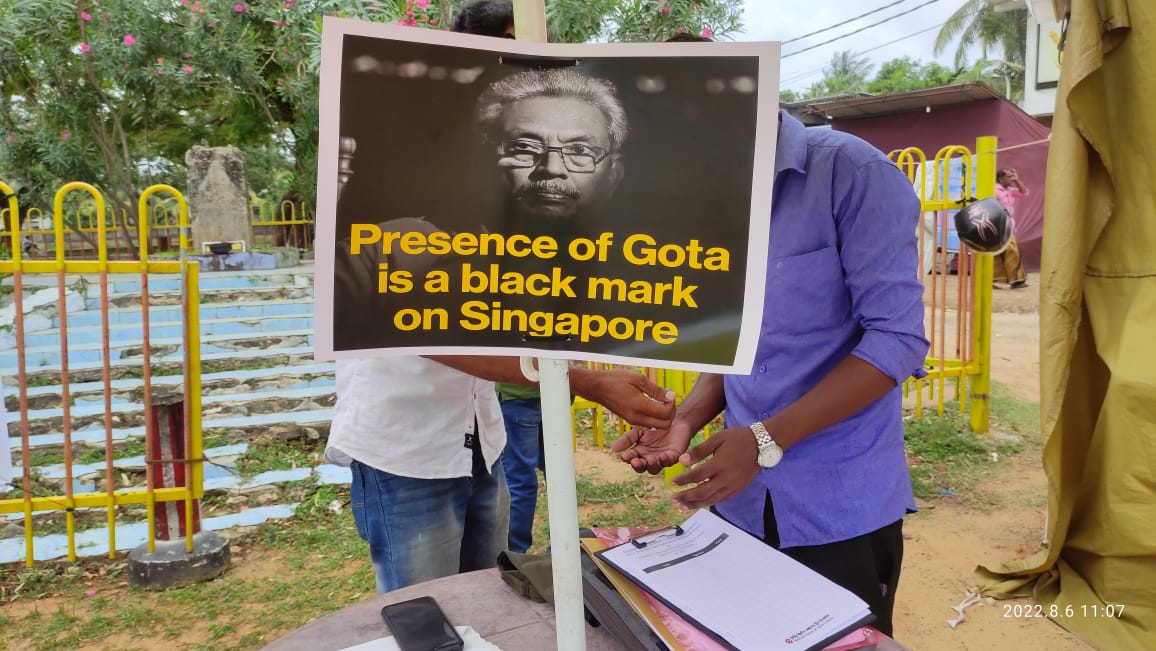
In Jaffna, walls are papered with posters calling for the arrest of exiled Sri Lankan president, Gotabaya Rajapaksa, for the crime of genocide. Men and women line up to sign petitions calling on Singapore to deliver justice for the atrocities they suffered and in remembrance of those they lost. Across the globe, they are joined in unison by a diaspora who refuse to forget the thousands of Tamils slaughtered under the command of the former president. Outside Singapore’s embassies Tamils cry out to Singapore to deliver them justice.
For as long as Rajapaksa remains on the island without diplomatic immunity, Singapore is presented with a unique opportunity to deliver a modicum of justice to Eelam Tamils who have suffered decades of mass atrocities, violent discrimination, and genocide by the Sri Lankan state.
Despite 13 years passing since the massacres at Mullivaikkal, none of the architects have been held accountable. Not the generals who led Tamil civilians into designated “no-fire” zones before shelling them relentlessly. Nor the soldiers who indiscriminately slaughtered men, women, and children who had surrendered to their custody. Nor the officials sharing videos of Tamil women being sexually abused and mutilated. 13 years ago, despite the pleas of the Tamil community for UN officials to bear witness to their suffering, the world turned a deaf ear. 13 years since and the world remains deaf to ongoing Tamil suffering.
Despite this Tamil Families of the Disappeared remain resolute, they have continued to occupy roadsides for almost 2,000 days. Their calls for justice for the thousands of Tamils who disappeared by the Sinhala state cannot be muted. Yet with each passing day, mothers and fathers are dying without ever knowing the fate of their loved ones. At least 115 parents have passed away without seeing justice delivered.
Tamils are well aware that justice cannot be found in Sri Lanka, a country whose citizenry had voted in massive majorities to appoint this war criminal as their leader. It was under his watch that the perpetrators of grave injustices to Tamils were elevated to the highest ranks in government whilst those investigating these atrocities were forced to flee the country. The UN High Commissioner for Human Rights has repeatedly called on member states to prosecute Sri Lankan war criminals in their courts through the principle of universal jurisdiction, but states remain passive. Singapore is at a pivotal point in history to act upon what should have been redressed years and decades ago.
However, Singaporean Tamil citizens remain sceptical. In the Speaker’s Corner in Hong Lim Park -the only place in Singapore where protests can legally be held without a permit- Prabu Ramachandran, holds a one-man demonstration demanding Rajapaksa’s arrest. He speaks to the widely felt sentiment of anger by Singaporean Tamils against their government.
“I am upset, hurt and do feel betrayed in some sense but not surprised at the same time,” a local Singaporean Tamil told the Tamil Guardian.
“We have not been able to protest or express our discontent publicly with other issues in Singapore”.
Despite the Foreign Ministry’s insistence that Rajapaksa has not been afforded any privileges, the refusal to prosecute Sri Lanka’s génocidaire acts as complicity. The stifling of Tamil voices and perpetuation of injustice won’t be forgotten.
As parliamentarians, human rights groups, and Tamil survivors call on Singapore to deliver justice, it remains to be seen what Halimah Yacob’s government will do. With news breaking that Rajapaksa will attempt to flee to Thailand, the window of opportunity is closing.
